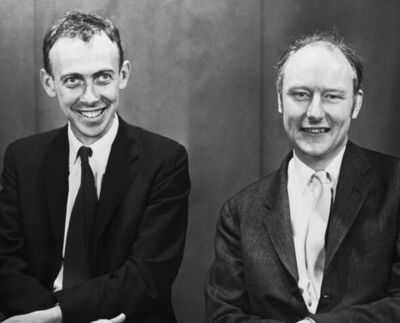James D. Watson, whose co-discovery of the twisted-ladder structure of DNA in 1953 helped light the long fuse on a revolution in medicine, crimefighting, genealogy and ethics, has died. He was 97.
The breakthrough - made when the brash, Chicago-born Watson was just 24 - turned him into a hallowed figure in the world of science for decades. But near the end of his life, he faced condemnation and professional censure for offensive remarks, including saying Black people are less intelligent than white people.
Watson shared a 1962 Nobel Prize with Francis Crick and Maurice Wilkins for discovering that deoxyribonucleic acid, or DNA, is a double helix, consisting of two strands that coil around each other to create what resembles a long, gently twisting ladder.
That realisation was a breakthrough. It instantly suggested how hereditary information is stored and how cells duplicate their DNA when they divide. The duplication process begins with the two strands of DNA pulling apart, much like a zipper.
Even among non-scientists, the double helix would become an instantly recognisable symbol of science, appearing in works such as those of Salvador Dalí and on a British postage stamp.
The discovery helped open the door to more recent developments such as tinkering with the genetic makeup of living things, treating disease by inserting genes into patients, identifying human remains and criminal suspects from DNA samples and tracing family trees. However, it has also raised a host of ethical questions, such as whether we should alter the body's blueprint for cosmetic reasons or in a way that is transmitted to a person's offspring.
"Francis Crick and I made the discovery of the century, that was pretty clear," Watson once said. He later wrote: "There was no way we could have foreseen the explosive impact of the double helix on science and society."
Watson never made another lab finding that big. But in the decades that followed, he wrote influential textbooks and a best-selling memoir and helped guide the project to map the human genome. He selected bright young scientists and assisted them. And he used his prestige and contacts to influence science policy.
Watson died in hospice care after a brief illness, his son said Friday. His former research lab confirmed he had passed away a day earlier.
"He never stopped fighting for people who were suffering from disease," Duncan Watson said of his father.
Watson's initial motivation for supporting the gene project was personal: His son Rufus had been hospitalised with a possible diagnosis of schizophrenia, and Watson figured that knowing the complete makeup of DNA would be crucial for understanding that disease - maybe in time to help his son.
He gained unwelcome attention in 2007, when the Sunday Times Magazine of London quoted him as saying he was "inherently gloomy about the prospect of Africa" because "all our social policies are based on the fact that their intelligence is the same as ours - where all the testing says not really." He said that while he hopes everyone is equal, "people who have to deal with black employees find this is not true."
You may also like

Is Nikola Jokic playing tonight vs the Golden State Warriors? Latest update on the Denver Nuggets star's injury report (November 7, 2025)

Have I Got News For You sparks uproar for broadcasting c-word multiple times

Raw vs roasted nuts: Health benefits, nutritional differences, and potential risks explained

Liverpool trains: Lime Street Station delays after 'emergency' near St Helens

Conservatives report Keir Starmer over Lisa Nandy 'cronyism' scandal







